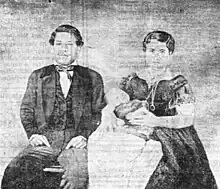Kalama
Kalama Hakaleleponi Kapakuhaili (1817 – September 20, 1870) was a Queen consort of the Kingdom of Hawaiʻi alongside her husband, Kauikeaouli, who reigned as King Kamehameha III. Her second name Hakaleleponi is Hazzelelponi in Hawaiian.[1]
| Kalama | |||||
|---|---|---|---|---|---|
_(cropped).png.webp) | |||||
| Queen consort of the Hawaiian Islands | |||||
| Tenure | February 14, 1837 – December 15, 1854 | ||||
| Born | March 17, 1817 Ka'elepulu near Kailua, Hawaii, | ||||
| Died | September 20, 1870 (aged 53) Honolulu, Oahu, Hawaii | ||||
| Burial | October 8, 1870 | ||||
| Spouse | Kamehameha III | ||||
| Issue | Keaweaweʻulaokalani I Keaweaweʻulaokalani II | ||||
| |||||
| House | House of Kamehameha | ||||
| Father | High Chief Naihekukui | ||||
| Mother | High Chiefess Iʻahuʻula | ||||
Early life
She was the only child of Kona chief Naihekukui, who was commander of the native Hawaiian fleet at Honolulu. Her mother was Chiefess Iʻahuʻula, the younger sister of Charles Kanaʻina. Kanaʻina would become hānai (Hawaiian form of adoption) parent of the child.
Kalama means "The Torch" in the Hawaiian language.
Marriage
The young Kamehameha III, the boy king at the time, was needing a suitable royal bride. Many of the traditional chiefs wanted a union between the king and his sister Nāhienaena, as had been customary in the Hawaiian court since its beginning; however, the Christian missionaries and chiefs, who held significant political power, opposed this suggestion, calling it incest.
Kamanele, the daughter of Governor John Adams Kuakini, was proposed as the most suitable in age, rank, and education. The young king fell in love with Kalama in 1832. This angered his sister Kīnaʻu and many of the high chiefs. Kamehameha III married her on February 14, 1837. This was only a few months after Nahienaena's death.[2][3]
Children

Kalama and Kamehameha III had two children who died in their infancy. Both were named Keaweaweulaokalani, after their father.
She and Kamehameha III would later hānai (adopt) their nephew Alexander Liholiho, who later became Kamehameha IV. She also adopted Kaʻiminaʻauao, the daughter of Analea Keohokālole and Caesar Kapaʻakea as her own. She even adopted her husband's son Albert Kukaʻilimoku Kunuiakea by Jane Lahilahi Young.
Later life
.jpg.webp)
She would outlive both her husband Kamehameha III and her nephew Kamehameha IV, becoming known as the Queen dowager of Hawaii. She met Prince Alfred on his visit to Hawaii in the reign of Kamehameha V. She drove out to Waikīkī in her own carriage of state, accompanied by her adopted son, Kunuiakea, and Miriam Likelike. The drivers of these carriages wore the royal feather shoulder capes, and the footmen were clad in like royal fashion. It was considered one of the grandest occasions in the history of those days.[4] Kalama skillfully managed her properties and at the time of her death, she owned over 22,000 acres on the windward side of the island of Oahu.[5][6]: 185 In her will, her uncle Charles Kanaina was declared as the heir to her vast lands and properties.[1] She died on September 20, 1870, in Honolulu at the age of 53. On September 21, American marines had to be landed to place the American flag at half-mast, when the American consul at Honolulu would not assume responsibility for doing so, owing to a past instance where the Queen's death was falsely reported.[4]
Namesakes
- Hakaleleponi Gate, an entrance for servants and attendants in ʻIolani Palace, is named after her.[7]
- In 1925, Harold K.L. Castle developed Kailua's first housing tract and named it Kalama after the Queen, who previously had owned the land in the Kailua area.[8]
- Kalama Beach Park, the former Boettcher Estate, became a municipal park in 1978 and was listed on the National Register of Historic Places in 2002.[9]
References
- "KALAMA, H. ALii Award L.C.A. 4452" (PDF). Kanaka Genealogy web site. Retrieved March 27, 2012.
- Hiram Bingham I (1855) [1848]. "Chapter XVII". A Residence of Twenty-one Years in the Sandwich Islands (Third ed.). H.D. Goodwin.
- Gavan Daws (1968). Shoal of time: a History of the Hawaiian Islands. University of Hawaii Press. pp. 91–94. ISBN 0-8248-0324-8.
- Hawaii's Story by Hawaii's Queen written by Liliuokalani
- Keauhouresort Archived 2011-11-29 at the Wayback Machine
- Barbara Bennett Peterson (1984). Notable Women of Hawaii. University of Hawaii Press. ISBN 0-8248-0820-7.
- Taylor, Albert Pierce (1927). The Rulers of Hawaii, The Chiefs and Chiefesses, Their Palaces, Monuments, Portraits and Tombs. Honolulu: Advertiser Publishing Company. p. 40. OCLC 9380797.
-
 Clark, John R. K. (2002). Hawaiʻi Place Names. Honolulu, HI, USA: University of Hawaiʻi Press. p. 150. ISBN 978-0-8248-2451-8. OCLC 53481915. Retrieved 2013-03-23. (subscription required)
Clark, John R. K. (2002). Hawaiʻi Place Names. Honolulu, HI, USA: University of Hawaiʻi Press. p. 150. ISBN 978-0-8248-2451-8. OCLC 53481915. Retrieved 2013-03-23. (subscription required) - "National Register Information System". National Register of Historic Places. National Park Service. July 9, 2010.